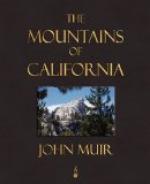I made my bed in a nook of the pine-thicket, where the branches were pressed and crinkled overhead like a roof, and bent down around the sides. These are the best bedchambers the high mountains afford—snug as squirrel-nests, well ventilated, full of spicy odors, and with plenty of wind-played needles to sing one asleep. I little expected company, but, creeping in through a low side-door, I found five or six birds nestling among the tassels. The night-wind began to blow soon after dark; at first only a gentle breathing, but increasing toward midnight to a rough gale that fell upon my leafy roof in ragged surges like a cascade, bearing wild sounds from the crags overhead. The waterfall sang in chorus, filling the old ice-fountain with its solemn roar, and seeming to increase in power as the night advanced—fit voice for such a landscape. I had to creep out many times to the fire during the night, for it was biting cold and I had no blankets. Gladly I welcomed the morning star.
The dawn in the dry, wavering air of the desert was glorious. Everything encouraged my undertaking and betokened success. There was no cloud in the sky, no storm-tone in the wind. Breakfast of bread and tea was soon made. I fastened a hard, durable crust to my belt by way of provision, in case I should be compelled to pass a night on the mountain-top; then, securing the remainder of my little stock against wolves and wood-rats, I set forth free and hopeful.
How glorious a greeting the sun gives the mountains! To behold this alone is worth the pains of any excursion a thousand times over. The highest peaks burned like islands in a sea of liquid shade. Then the lower peaks and spires caught the glow, and long lances of light, streaming through many a notch and pass, fell thick on the frozen meadows. The majestic form of Ritter was full in sight, and I pushed rapidly on over rounded rock-bosses and pavements, my iron-shod shoes making a clanking sound, suddenly hushed now and then in rugs of bryanthus, and sedgy lake-margins soft as moss. Here, too, in this so-called “land of desolation,” I met cassiope, growing in fringes among the battered rocks. Her blossoms had faded long ago, but they were still clinging with happy memories to the evergreen sprays, and still so beautiful as to thrill every fiber of one’s being. Winter and summer, you may hear her voice, the low, sweet melody of her purple bells. No evangel among all the mountain plants speaks Nature’s love more plainly than cassiope. Where she dwells, the redemption of the coldest solitude is complete. The very rocks and glaciers seem to feel her presence, and become imbued with her own fountain sweetness. All things were warming and awakening. Frozen rills began to flow, the marmots came out of their nests in boulder-piles and climbed sunny rocks to bask, and the dun-headed sparrows were flitting about seeking their breakfasts. The lakes seen from every ridge-top were brilliantly rippled and spangled, shimmering like the thickets of the low Dwarf Pines. The rocks, too, seemed responsive to the vital heat—rock-crystals and snow-crystals thrilling alike. I strode on exhilarated, as if never more to feel fatigue, limbs moving of themselves, every sense unfolding like the thawing flowers, to take part in the new day harmony.




